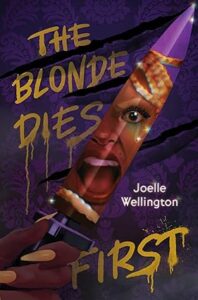The Blonde Dies First by Joelle Wellington
Simon & Schuster Books for Young Readers, 2024
ISBN-13 : 978-1665922456
Available: Hardcover, paperback, Kindle edtion, audiobook
Buy: Bookshop.org | Amazon.com
In The Blonde Dies First, Joelle Wellington tries to subvert the teenage horror slasher movie. She takes an interesting approach, but ultimately there are too many loose ends, unrealistic situations, and undeveloped characters for the book to be successful in its approach.
The book follows a group of six teens living in the same neighborhood who have been friends since childhood: Leila, a would-be artist; Gael, a horror lover who has already directed a short film; Malachi, a black queer boy; Devon, twin sister to genius Drew; Drew, the skeptic, who attends private school, and Yaya, Devon’s longtime crush. Most of the friends are Black, with the exception of Leila.
When Drew announces her early graduation, Devon is crushed. Although they haven’t been close for many years, Devon makes plans to spend time with Drew and their friends before she leaves for college.
The friends go to a party with Drew, held by her school friend Avery in a tony part of town. During the party, he decides they should summon a demon using a Ouija board and an athame. Devon tamps down her misgivings and participate, but the friends are disturbed by the summoning attempt. Gael recognizes the ritual from a horror movie, Read Your Rites. Avery claims the athame is real, and that his mom contributed to the research behind the movie as part of her job as a museum curator.
Gael talks about horror movie tropes: the blonde dies first, the black queer guy dies next, then the asshole, the nerd, the independent girl, and the final girl. Sex will summon the movie’s demon, and the person who summons the demon has to be eliminated to get rid of the creature. The demon summoned in the movie has to go through these character tropes in a specific order and can’t go backwards.
Devon, who bleaches her hair, is the first to encounter the demon, at the convenience store where she works with the annoying Alexis.. It drives them out of the store and shoves Alexis, also blonde, into the street, where she is hit and killed by a car. The requirement satisfied, Devon survives. No one believes Devon, with the police insisting Alexis must have jumped in front of the car..
While the friends, especially Drew, don’t believe Devon at first, soon Malachi is attacked, but the demon takes his date instead. With two of them vouching for the demon attacks, Gael tries to figure out the rules the demon is following, based on the movie.
Gael assumes he’s the asshole and will be next, The others film him and Leila making out in Leila’s bedroom in hopes of summoning the demon,, but it turns out the demon wants Drew for that role . As they battle the demon, Leila falls down the stairs and breaks her ankle. While they’re waiting at the hospital, they spot the demon, who is still after Drew. Leila’s racist doctor follows them into a room and demands they leave, and the demon attacks and kills him instead of Drew.
These kids get away with a lot, even for YA fiction. Leila’s parents know they are smoking weed, drinking, and involved in some pretty risky behaviors that they never outright address. Because they are involved in a group chat with the other kids’ parents, all of them must be pretty aware of what the kids are into. It’s only when Leila breaks her ankle that the parents clamp down.
Drew and Devon’s mother has been planning a summer block party every year for years and it is the big summer event in the community. The friends are sure the block party will be the final act in their living horror movie and plan to face it together, but Drew and Devon have a blowout fight and Devon takes off to see Yaya, finally tells Yaya she likes her romantically. In a surprise twist, (spoiler) it turns out that Devon is the final girl, and Yaya is the love interest who is supposed to be killed at the end of the movie. In another surprise twist, the demon is controlled by entitled neighborhood creep Keith, whose gentrifier mother Kendra was a production assistant on Read Your RItes,(meaning Avery has nothing to do with the monster stalking them). Kendra has no qualms about Keith eating the friends to satisfy the demon and make the neighborhood quieter.
The story touches on issues but doesn’t really address them. After Alexis is hit by the car, Devon is hostile to the police in her interview. Her hostility and interactions with the police are a potential plot thread, but Wellington does not explore it. Kendra, determined to gentrify the community, who is generally disliked also threatens them with calling the cops.
This gentrification storyline could be stronger: trusted neighbors and friends give Kendra and Keith the benefit of the doubt, treating them as if they are annoying, not dangerous. There’s also room to explore privilege and entitlement further: Keith, in his 20s, is routinely excused for his predatory behavior towards Yaya, and Drew, usually a skeptic, humors Avery’s pushy, irrational actions. Alyssa Cole did a great job dealing with class, race, police hostility, and gentrification in When No One Is Watching. Wellington is not as successful here. But it’s an ambitious book: Wellington had to integrate a supernatural element, a metafictional approach to horror movie elements, and a fair amount of teenage and sisterly drama involving six kids. Despite the unwieldy number of characters and missed opportunities, she keeps the reader entertained and turning the pages.
Reviewed by Kirsten Kowalewski






Follow Us!